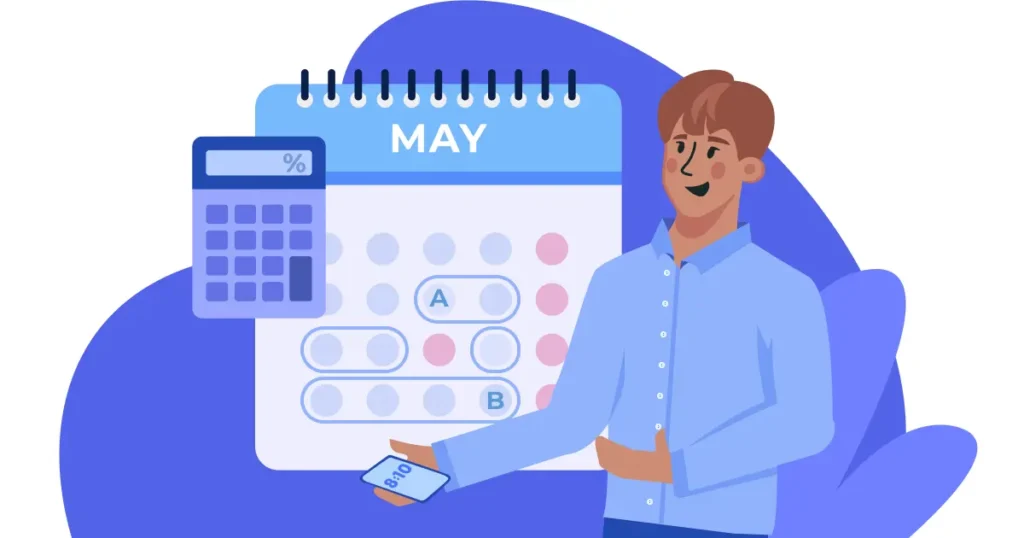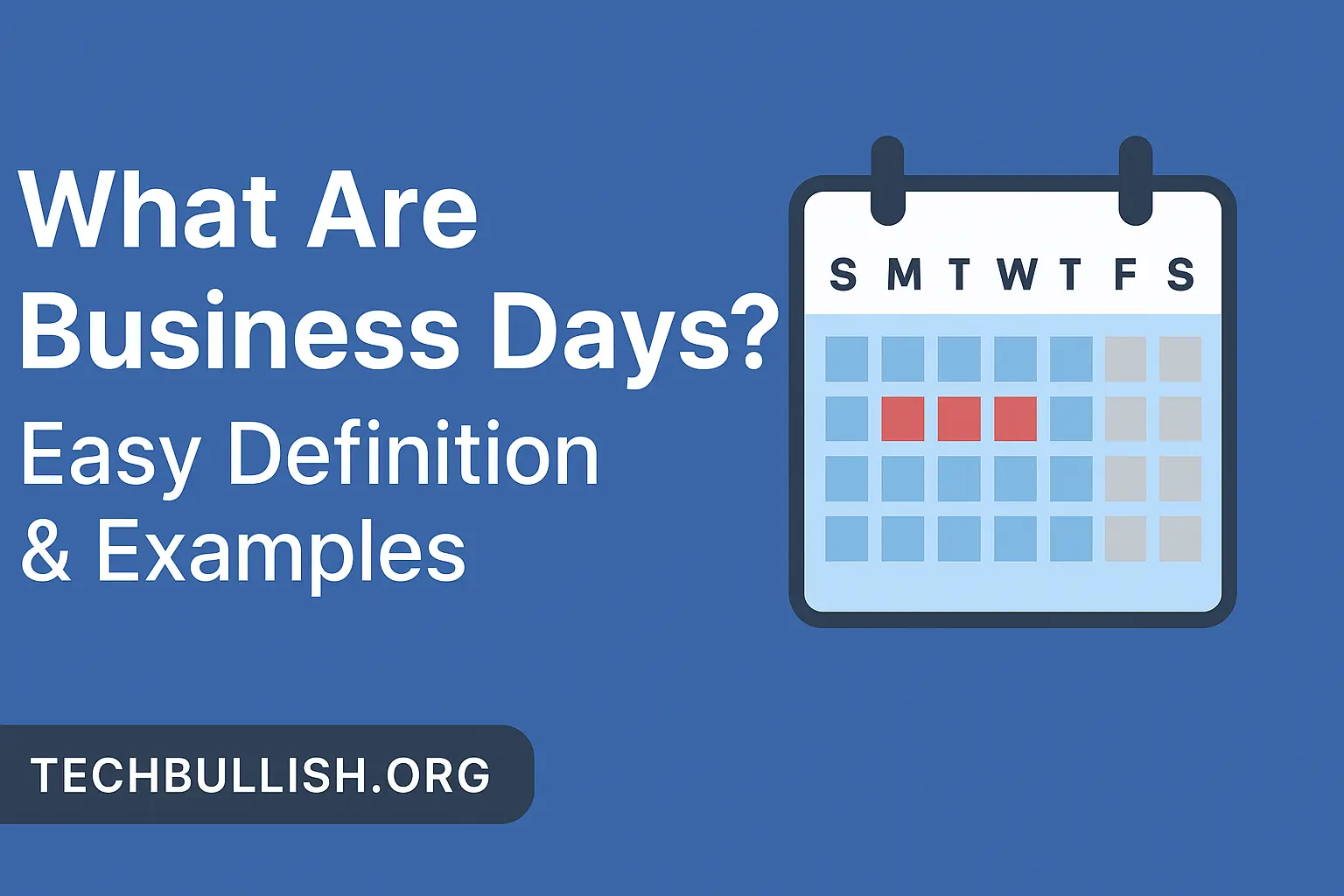What Are Business Days? Easy Definition & Examples
Have you ever ordered something online, and the website said, “Your package will arrive in 5 days”? You wondered, “Wait, what does that really mean?” Does it include Saturday and Sunday? What about public holidays?
This is where the idea of days comes in. Business days are a common term used in shipping, banking, contracts, jobs, and many other areas of life. But not everyone understands them clearly. That confusion can sometimes cause stress when you are waiting for a delivery, counting down to payday, or trying to meet a deadline.
In this simple but detailed guide, we will break down what business days are, why they matter, how to calculate them, and how they differ from other types of days. We will also examine how business days vary across different countries and address the most frequently asked questions about them.
By the end of this article, you will never be confused again when someone says, “It will take three business days.”
1. What Does “Business Day” Mean?
A business day is a day when most companies, offices, and banks are open for regular business operations. Usually, this means Monday through Friday, from around 9:00 AM to 5:00 PM.
Weekends (Saturday and Sunday) and public holidays are not business days in most countries.
👉 In short:
- Business Days = Weekdays (Mon–Fri, excluding holidays)
- Non-Business Days = Weekends + Public Holidays
For example, if today is Friday and your bank says your payment will take “2 business days,” it means it will likely be done by Tuesday, since Saturday and Sunday do not count.
2. Why Do Business Days Matter?
Business days may sound simple, but they matter a lot in real life. Here are some places where they are used:
- Shipping & Deliveries → Online stores like Amazon or eBay give delivery times in days.
- Banking & Finance → Payments, loan approvals, and transfers usually happen only on certain days.
- Contracts & Legal Work → Agreements often say, “X must be done within ten business days.”
- Jobs & Workplaces → Companies use business days to calculate working hours, deadlines, and benefits.
Without the idea of days, there would be a lot of confusion. If someone said “5 days” without explaining whether weekends or holidays are included, misunderstandings would happen very often.
Understanding Business Days, Calendar Days, and Working Days
Many people mix up these terms, but they are not the same. Let’s compare:
1. Business Days
- Meaning: Weekdays (Mon–Fri), excluding weekends and public holidays.
- Example: If today is Monday, five business days later will be next Monday.
2. Calendar Days
- Meaning: Every single day on the calendar (including weekends and holidays).
- Example: If today is Monday, five calendar days later is Saturday.
3. Working Days
- Meaning: Any day when work is done in a specific industry or company (which could include weekends).
- Example: A hospital may count Sunday as a working day.
Important Note
👉 If your boss says, “Finish this report in 7 calendar days,” and today is Friday, then it’s due next Friday. But if they say, “Finish in 7 days,” and there is a holiday on Monday, then your report is due the following Tuesday.
4. Standard Business Day Hours
In most places, a business day lasts about 8 hours — from 9:00 AM to 5:00 PM.
But this can change:
- Some companies open earlier (8:00 AM) or close later (6:00 PM).
- Some countries have shorter or longer workdays.
- Banks often close earlier in the afternoon.
👉 When people say “one business day,” it usually means a full workday within these hours.
For example, if you send money at 4:50 PM on a Friday, the bank may not count it until Monday because Friday’s business hours are almost over.
5. How to Calculate Business Days
Many people get confused about how to count business days. Here’s a simple step-by-step method:
- Check if the start day counts → Most times, the count starts on the next day.
- Skip weekends → Saturday and Sunday don’t count (in most countries).
- Skip holidays → Public holidays also don’t count.
- Count only the weekdays that are left.
Example 1:
If today is Wednesday and something takes three business days:
- Thursday = Day 1
- Friday = Day 2
- Monday = Day 3. Result = You’ll have it by Monday.
Example 2:
If today is Friday and something takes two business days:
- Monday = Day 1
- Tuesday = Day 2. Result = Done by Tuesday.
👉 Tip: You can use online business day calculators or Excel formulas to count faster, especially for contracts.

6. Business Days Around the World
Not all countries follow the same business days.
- United States, UK, Canada, Australia → Monday to Friday are days; weekends are off.
- Business week is often from Sunday to Thursday, with Friday and Saturday as the weekends.
- South Asia (India, Pakistan, Bangladesh) → Generally, Monday to Friday, but many private companies also open on Saturdays.
- China & Japan → Monday to Friday, but some industries operate on Saturdays.
This shows why it is important to clarify days (when making international deals).
7. Business Days in Different Situations
a) Shipping & Deliveries
When Amazon or another company says “Delivery in 5 business days,” weekends don’t count. If you order on Friday, you may have to wait until next Friday.
b) Banking & Payments
Banks only process payments during business days. A transfer sent Friday evening may not show up until Monday or Tuesday.
c) Contracts and Legal Work
Many contracts include a line like: “If a deadline falls on a non-business day, it will be extended to the next day.”
d) Workplace Deadlines
Companies often say, “Submit the report within 10 days.” That usually gives you about two weeks.
8. Common Misconceptions About Business Days
- Myth 1: Saturday is always a business day. 👉 Truth: Not in most countries. Some industries may count it, but usually it’s not.
- Myth 2: A business day means 24 hours. 👉 Truth: It usually means only the working hours of a day (9 AM–5 PM).
- Myth 3: All countries follow the same days. 👉 Truth: As explained, it varies by region.
- Myth 4: If something says “next day,” it always means tomorrow. 👉 Truth: If tomorrow is a holiday or weekend, it means the next working day.
9. FAQs About Business Days
Q1: How many business days are in a week?
Usually, 5 days (Monday–Friday).
Q2: Is Sunday a business day?
No, not in most countries.
Q3: Does “3 business days” include today?
Usually not. The count starts the next day unless stated otherwise.
Q4: What if a holiday falls between?
Then it does not count. You must add an extra day.
Q5: Can a business day be less than a full day?
Yes. If you send something late on a Friday, the bank may not process it until Monday.
10. Tips for Managing Business Days
- Always check the calendar for public holidays.
- Ask if the count includes the current day or starts tomorrow.
- For contracts, write down exactly what “business day” means.
- When working with international partners, clarify each country’s week.
- Use online calculators or apps to save time.
11. Conclusion
Now you know the answer to the question: “What are business days?” They are the weekdays when most businesses, banks, and offices are open — usually Monday to Friday, not including weekends or holidays.
Understanding business days helps you:
- Track deliveries correctly.
- Avoid banking delays.
- Plan work deadlines.
- Write clear contracts.
Next time you see “5 days,” you will know exactly what it means and how to count them.




